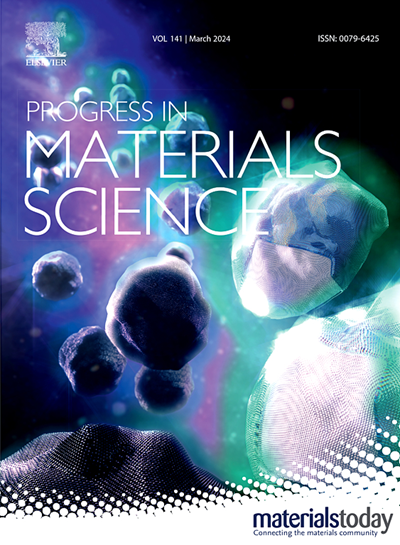A comprehensive review of 4D-printed thermo-responsive hydrogel-based smart actuators for solar steam generation: Advanced design, modeling, manufacturing, and finite element analysis
IF 33.6
1区 材料科学
Q1 MATERIALS SCIENCE, MULTIDISCIPLINARY
引用次数: 0
Abstract
The worldwide request for clean water and renewable energy is growing rapidly due to the rising population, changing ways of life, expanding economies, and increased utilization of natural resources. One way researchers from multiple disciplines are striving to meet these demands is to develop a direct solar steam generation (DSSG) system providing steam interrelated with the water-energy conversion process. To maximize steam generation, various systems have been developed based on the water supply path and efficient photothermal conversion structures. However, evaporative systems are vulnerable to salt generation and antifouling/antimicrobial problems, which can cause irreparable damage. To overcome these problems, recent research has been focused on thermo-responsive shape-morphing hydrogel-based DSSG systems. Although reversible actuators and materials for biomedical, soft robotics, tissue engineering, and other applications have been discussed in several reviews, no comprehensive insight has been provided on thermo-responsive actuators for DSSG. The aim of this review is to address these points while providing a comprehensive insight into thermo-responsive actuators. This is achieved by covering new and existing design and modeling strategies for hydrogel actuators with shape-morphing properties, including material modeling and numerical analysis, along with uncovering their working mechanism and production through 4D printing and evaporation dynamics.
全面评述用于太阳能蒸汽发电的基于热响应水凝胶的 4D 打印智能致动器:先进的设计、建模、制造和有限元分析
随着人口的增加、生活方式的改变、经济的发展和自然资源利用率的提高,全世界对清洁水和可再生能源的需求正在迅速增长。来自多个学科的研究人员正在努力满足这些需求,其中一种方法就是开发一种直接太阳能蒸汽发电(DSSG)系统,提供与水能转换过程相关的蒸汽。为了最大限度地产生蒸汽,人们根据供水路径和高效光热转换结构开发了各种系统。然而,蒸发系统容易产生盐分和防污/抗菌问题,从而造成不可挽回的损失。为了克服这些问题,最近的研究重点是基于热响应形状变构水凝胶的 DSSG 系统。虽然多篇综述讨论了用于生物医学、软机器人、组织工程和其他应用的可逆致动器和材料,但尚未对用于 DSSG 的热响应致动器提供全面的见解。本综述旨在解决这些问题,同时提供有关热响应致动器的全面见解。为了实现这一目标,本综述介绍了具有形状变形特性的水凝胶致动器的新的和现有的设计和建模策略,包括材料建模和数值分析,以及通过 4D 打印和蒸发动力学揭示其工作机制和生产。
本文章由计算机程序翻译,如有差异,请以英文原文为准。
求助全文
约1分钟内获得全文
求助全文
来源期刊

Progress in Materials Science
工程技术-材料科学:综合
CiteScore
59.60
自引率
0.80%
发文量
101
审稿时长
11.4 months
期刊介绍:
Progress in Materials Science is a journal that publishes authoritative and critical reviews of recent advances in the science of materials. The focus of the journal is on the fundamental aspects of materials science, particularly those concerning microstructure and nanostructure and their relationship to properties. Emphasis is also placed on the thermodynamics, kinetics, mechanisms, and modeling of processes within materials, as well as the understanding of material properties in engineering and other applications.
The journal welcomes reviews from authors who are active leaders in the field of materials science and have a strong scientific track record. Materials of interest include metallic, ceramic, polymeric, biological, medical, and composite materials in all forms.
Manuscripts submitted to Progress in Materials Science are generally longer than those found in other research journals. While the focus is on invited reviews, interested authors may submit a proposal for consideration. Non-invited manuscripts are required to be preceded by the submission of a proposal. Authors publishing in Progress in Materials Science have the option to publish their research via subscription or open access. Open access publication requires the author or research funder to meet a publication fee (APC).
Abstracting and indexing services for Progress in Materials Science include Current Contents, Science Citation Index Expanded, Materials Science Citation Index, Chemical Abstracts, Engineering Index, INSPEC, and Scopus.
 求助内容:
求助内容: 应助结果提醒方式:
应助结果提醒方式:


